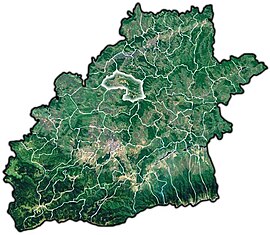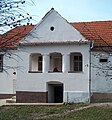Șeica Mare: Difference between revisions
m r2.6.4) (Robot: Adding uk:Шейка-Маре |
|||
| (47 intermediate revisions by 24 users not shown) | |||
| Line 1: | Line 1: | ||
{{Update|date=July 2010}} |
{{Update|date=July 2010}} |
||
{{Infobox |
{{Infobox Romanian subdivision |
||
|type = commune |
|||
|name=Şeica Mare |
|||
|county = Sibiu |
|||
|settlement_type=[[Communes of Romania|Commune]] |
|||
|name = Șeica Mare |
|||
|total_type= |
|||
|image_flag = |
|||
|image_map= |
|||
|image_shield = |
|||
|map_caption= |
|||
|image_skyline = Buia.JPG |
|||
|coordinates_region=RO |
|||
|image_map = Seica Mare jud Sibiu.jpg |
|||
|subdivision_type=Country |
|||
|map_caption = Location in Sibiu County |
|||
|subdivision_name={{flag|Romania}} |
|||
|leader_name = Nicolae Șușa |
|||
|subdivision_type1=[[Counties of Romania|County]] |
|||
|leader_party = PNL |
|||
|subdivision_name1=[[Sibiu County]] |
|||
|leader_term = 2020–2024 |
|||
| ⚫ | |||
|coordinates = {{coord|46|1|N|24|9|E|region:RO|display=it}} |
|||
| ⚫ | |||
|elevation = 337 |
|||
|population_footnotes=<ref>[http://recensamant.referinte.transindex.ro/?pg=3&id=2298 Romanian census data, 2002]; retrieved on March 1, 2010</ref> |
|||
|elevation_min = |
|||
|latd=46|latm=1|lats=|latNS=N|longd=24|longm=9|longs=|longEW=E |
|||
|elevation_max = |
|||
|pushpin_map=Romania |
|||
|area_total = 120.24 |
|||
|timezone=[[Eastern European Time|EET]]|utc_offset=+2 |
|||
| ⚫ | |||
|timezone_DST=[[Eastern European Summer Time|EEST]]|utc_offset_DST=+3 |
|||
| ⚫ | |||
|population_footnotes = |
|||
|postal_code = 557245 |
|||
|area_code = (+40) 02 69 |
|||
|website = {{url|https://seicamare.ro}} |
|||
}} |
}} |
||
'''Şeica Mare''' ({{lang-de|Marktschelken}}; {{lang-hu|Nagyselyk}}) is a [[Commune in Romania|commune]] located in [[Sibiu County]], [[Romania]]. It is composed of six villages: Boarta, Buia, Mighindoala, Petiş, Şeica Mare and Ştenea. Calvaser (''Kaltwasser''; ''Hidegvíz'') was also a village until the late 20th century, when it was absorbed by Şeica Mare village. |
|||
'''Șeica Mare''' ({{langx|de|Marktschelken}}; [[Transylvanian Saxon dialect|Transylvanian Saxon]]: ''Martscheelken'';<ref>{{cite web|lang=de|url=https://www.siebenbuerger.de/ortschaften/marktschelken|title=Marktschelken|author=Verband der Siebenbürger Sachsen in Deutschland e.V. (i.e. [[Association of Transylvanian Saxons in Germany]])|work=Siebenbuerger.de|accessdate=11 February 2023}}</ref> {{langx|hu|Nagyselyk}}) is a [[Commune in Romania|commune]] located in [[Sibiu County]], [[Transylvania]], [[Romania]]. It is composed of six villages: Boarta (''Michelsdorf''; ''Mihályfalva''), Buia (''Bell''; ''Bólya''), Mighindoala (''Engenthal''; ''Ingodály''), Petiș (''Petersdorf''; ''Kispéterfalva''), Șeica Mare, and Ștenea (''Stein''; ''Isztina''). Calvaser (''Kaltwasser''; ''Hidegvíz'') was also a village until the late 20th century, when it was absorbed by Șeica Mare village. |
|||
| ⚫ | |||
== Geography == |
|||
The commune is situated on the [[Transylvanian Plateau]], on the banks of the river [[Vișa]]; the rivers [[Calva (river)|Calva]] and [[Râpa (Vișa)|Râpa]] flow into the Vișa in Șeica Mare. |
|||
Located in the north-central part of the county, the commune is crossed by [[Roads in Romania|national road]] {{ill|DN14|ro}}. The closest city is [[Mediaș]], {{cvt|23|km}} to the northeast; the county seat, [[Sibiu]], is {{cvt|32|km}} to the south. |
|||
The Șeica Mare train station serves the [[Căile Ferate Române|CFR]] |
|||
[[Căile Ferate Române Line 200|rail line 208]], which runs north from Sibiu to [[Copșa Mică]]. |
|||
== Demographics == |
|||
At the 2011 census, Șeica Mare had 4,470 inhabitants. Of those, 88.8% were [[Romanians]], 6% were [[Hungarians in Romania|Hungarians]], 4.2% were [[Romani people in Romania|Roma]], and 1% were [[Germans of Romania|Germans]] (more specifically [[Transylvanian Saxons]]). |
|||
== Natives == |
|||
* [[Farkas Bolyai]] (1775–1856), mathematician |
|||
* [[Cornel Oțelea]] (born 1940), handball player |
|||
| ⚫ | |||
{{Unreferenced section|date=July 2010}} |
{{Unreferenced section|date=July 2010}} |
||
| ⚫ | |||
'''Buia''' village was first attested in a document of 1269, under the name of ''poss Bulla''. In 1918, it had 1167 residents, of whom 736 were Romanians and the rest Germans and Hungarians. By 2002, the population was down to 634: 516 Romanians, 104 Hungarians, and three Roma. The village is in the southern part of the commune, linked to Șeica Mare by an {{cvt|11|km}} stretch of county road.<ref>{{in lang|ro}} [http://www.seicamare.ro/?page_id=28 Sate aparţinătoare] at the Șeica Mare Town Hall site; accessed July 14, 2013</ref> [[Farkas Bolyai]] was born there in 1775.<ref>Barna Szénássy, ''János Bolyai Appendix'', p.220. [[Elsevier]], 1987, {{ISBN|0-080-87249-2}}</ref> |
|||
This place is located at 46.0000 North latitude and 24.2833 East longitude. The altitude is {{Convert|557|m|ft}} above the sea level. |
|||
| ⚫ | '''Mighindoala''' ({{langx|de|Engenthal}}, meaning "Angels' Valley",<ref>{{Cite web |url=http://www.istru.org/ |title=Istru Foundation |access-date=2011-05-30 |archive-date=2011-07-21 |archive-url=https://web.archive.org/web/20110721234030/http://istru.org/ |url-status=dead }}</ref> {{langx|hu|Ingodály}}) is a small village in the Șeica Mare commune. |
||
| ⚫ | As recently as 1975, the village had in excess of 50 houses, but was gradually deserted after the [[Communist Romania|communist regime]] withdrew infrastructure such as teachers and doctors. |
||
| ⚫ | As recently as 1975, the village had in excess of 50 houses, but was gradually deserted after the [[Communist Romania|communist regime]] withdrew infrastructure such as teachers and doctors.<ref>{{cite web|url=http://www.evz.ro/detalii/stiri/mighindoala-localitatea-cu-15-locuitori-913834.html|title=Mighindoala, localitatea cu 1,5 locuitori|lang=ro|newspaper=[[Evenimentul Zilei]]|first=Adam|last=Popescu|date=November 28, 2010|access-date=November 7, 2022}}</ref>{{Citation needed|date=July 2010}} As of 2004, there were only four people left in this village.{{Citation needed|date=July 2010}} There were only about ten buildings standing, including the [[Protestantism|Protestant]] church.{{Citation needed|date=July 2010}} The [[Romanian Orthodox Church|Romanian Orthodox]] church no longer has a roof, and is now abandoned. |
||
| ⚫ | |||
| ⚫ | |||
| ⚫ | |||
| ⚫ | |||
<gallery> |
<gallery> |
||
File:HPIM0178(castel_buia).jpg | Ruins of Buia Castle |
File:HPIM0178(castel_buia).jpg | Ruins of Buia Castle |
||
| Line 37: | Line 64: | ||
File:HPIM0528(BisericaSaseasca).jpg | German Church in Mighindoala |
File:HPIM0528(BisericaSaseasca).jpg | German Church in Mighindoala |
||
File:HPIM0733(veranda%2Bbaia)redusa.jpg | House in the village |
File:HPIM0733(veranda%2Bbaia)redusa.jpg | House in the village |
||
File:RO_SB_Seica_Mare_4.jpg|The [[Villages with fortified churches in Transylvania|fortified church]] of |
File:RO_SB_Seica_Mare_4.jpg|The [[Villages with fortified churches in Transylvania|fortified church]] of Șeica Mare |
||
File:RO_SB_Seica_Mare_3.jpg|The [[Villages with fortified churches in Transylvania|fortified church]] of |
File:RO_SB_Seica_Mare_3.jpg|The [[Villages with fortified churches in Transylvania|fortified church]] of Șeica Mare |
||
File:SeicaMareSB (2).JPG|The [[Villages with fortified churches in Transylvania|fortified church]] of |
File:SeicaMareSB (2).JPG|The [[Villages with fortified churches in Transylvania|fortified church]] of Șeica Mare |
||
File:RO_SB_Seica_Mare_1.jpg|The [[Villages with fortified churches in Transylvania|fortified church]] of |
File:RO_SB_Seica_Mare_1.jpg|The [[Villages with fortified churches in Transylvania|fortified church]] of Șeica Mare |
||
File:SeicaMareSB (5).JPG|Route {{ill|DN14|ro}} exiting Șeica Mare |
|||
</gallery> |
</gallery> |
||
| ⚫ | |||
| ⚫ | |||
{{Coord|46|01|N|24|09|E|display=title|region:RO_type:city_source:GNS-enwiki}} |
|||
| ⚫ | |||
{{Reflist}} |
{{Reflist}} |
||
| ⚫ | |||
{{Authority control}} |
|||
{{DEFAULTSORT:Seica Mare}} |
{{DEFAULTSORT:Seica Mare}} |
||
[[Category:Communes in Sibiu County]] |
[[Category:Communes in Sibiu County]] |
||
[[Category:Localities in Transylvania]] |
|||
{{Sibiu-geo-stub}} |
|||
[[br:Șeica Mare]] |
|||
[[de:Șeica Mare]] |
|||
[[eo:Șeica Mare]] |
|||
[[fr:Șeica Mare]] |
|||
[[it:Şeica Mare]] |
|||
[[hu:Nagyselyk]] |
|||
[[pt:Şeica Mare]] |
|||
[[ro:Șeica Mare, Sibiu]] |
|||
[[uk:Шейка-Маре]] |
|||
[[vo:Şeica Mare]] |
|||
Latest revision as of 13:53, 23 October 2024
This article needs to be updated. (July 2010) |
Șeica Mare | |
|---|---|
 | |
 Location in Sibiu County | |
| Coordinates: 46°1′N 24°9′E / 46.017°N 24.150°E | |
| Country | Romania |
| County | Sibiu |
| Government | |
| • Mayor (2020–2024) | Nicolae Șușa (PNL) |
Area | 120.24 km2 (46.42 sq mi) |
| Elevation | 337 m (1,106 ft) |
| Population (2021-12-01)[1] | 3,925 |
| • Density | 33/km2 (85/sq mi) |
| Time zone | EET/EEST (UTC+2/+3) |
| Postal code | 557245 |
| Area code | (+40) 02 69 |
| Vehicle reg. | SB |
| Website | seicamare |
Șeica Mare (German: Marktschelken; Transylvanian Saxon: Martscheelken;[2] Hungarian: Nagyselyk) is a commune located in Sibiu County, Transylvania, Romania. It is composed of six villages: Boarta (Michelsdorf; Mihályfalva), Buia (Bell; Bólya), Mighindoala (Engenthal; Ingodály), Petiș (Petersdorf; Kispéterfalva), Șeica Mare, and Ștenea (Stein; Isztina). Calvaser (Kaltwasser; Hidegvíz) was also a village until the late 20th century, when it was absorbed by Șeica Mare village.
Geography
[edit]The commune is situated on the Transylvanian Plateau, on the banks of the river Vișa; the rivers Calva and Râpa flow into the Vișa in Șeica Mare.
Located in the north-central part of the county, the commune is crossed by national road DN14. The closest city is Mediaș, 23 km (14 mi) to the northeast; the county seat, Sibiu, is 32 km (20 mi) to the south.
The Șeica Mare train station serves the CFR rail line 208, which runs north from Sibiu to Copșa Mică.
Demographics
[edit]At the 2011 census, Șeica Mare had 4,470 inhabitants. Of those, 88.8% were Romanians, 6% were Hungarians, 4.2% were Roma, and 1% were Germans (more specifically Transylvanian Saxons).
Natives
[edit]- Farkas Bolyai (1775–1856), mathematician
- Cornel Oțelea (born 1940), handball player
Villages
[edit]Buia village was first attested in a document of 1269, under the name of poss Bulla. In 1918, it had 1167 residents, of whom 736 were Romanians and the rest Germans and Hungarians. By 2002, the population was down to 634: 516 Romanians, 104 Hungarians, and three Roma. The village is in the southern part of the commune, linked to Șeica Mare by an 11 km (6.8 mi) stretch of county road.[3] Farkas Bolyai was born there in 1775.[4]
Mighindoala (German: Engenthal, meaning "Angels' Valley",[5] Hungarian: Ingodály) is a small village in the Șeica Mare commune.
As recently as 1975, the village had in excess of 50 houses, but was gradually deserted after the communist regime withdrew infrastructure such as teachers and doctors.[6][citation needed] As of 2004, there were only four people left in this village.[citation needed] There were only about ten buildings standing, including the Protestant church.[citation needed] The Romanian Orthodox church no longer has a roof, and is now abandoned.
The only economic activity is agriculture, very much based on the traditional farming of sheep, cows, and horses.[citation needed]
Gallery
[edit]-
Ruins of Buia Castle
-
The road on Mighindoala river valley
-
German Church in Mighindoala
-
House in the village
-
The fortified church of Șeica Mare
-
The fortified church of Șeica Mare
-
The fortified church of Șeica Mare
-
The fortified church of Șeica Mare
-
Route DN14 exiting Șeica Mare
References
[edit]- ^ "Populaţia rezidentă după grupa de vârstă, pe județe și municipii, orașe, comune, la 1 decembrie 2021" (XLS). National Institute of Statistics.
- ^ Verband der Siebenbürger Sachsen in Deutschland e.V. (i.e. Association of Transylvanian Saxons in Germany). "Marktschelken". Siebenbuerger.de (in German). Retrieved 11 February 2023.
- ^ (in Romanian) Sate aparţinătoare at the Șeica Mare Town Hall site; accessed July 14, 2013
- ^ Barna Szénássy, János Bolyai Appendix, p.220. Elsevier, 1987, ISBN 0-080-87249-2
- ^ "Istru Foundation". Archived from the original on 2011-07-21. Retrieved 2011-05-30.
- ^ Popescu, Adam (November 28, 2010). "Mighindoala, localitatea cu 1,5 locuitori". Evenimentul Zilei (in Romanian). Retrieved November 7, 2022.










![Route DN14 [ro] exiting Șeica Mare](/upwiki/wikipedia/commons/thumb/6/6e/SeicaMareSB_%285%29.JPG/120px-SeicaMareSB_%285%29.JPG)
